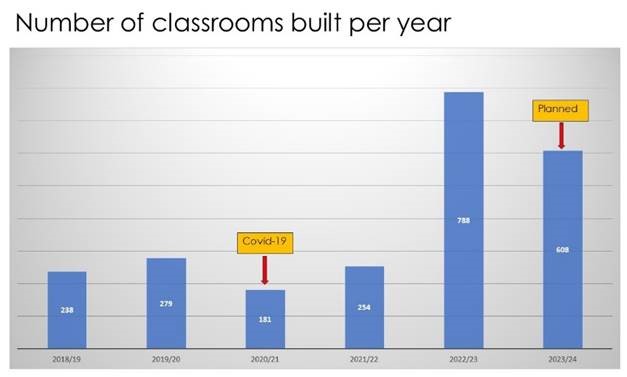With schools set to close soon, The Western Cape Education Department says its working hard to find placement for learners in the new year.
The provincial Education Department (WCED) says the number of learners requiring placement increased by 19 000 learners each year, for the past five years – with incoming grade 1 and grade 8 learners being the key areas.
Last year, the department committed itself to the Rapid School Build programme to address these ongoing issue of learner placement. The programme aims to supply the province with 842 additional classrooms in 2024, in the hopes of placing 26 000 additional learners. It says it managed to deliver 788 classrooms in this school year.

Education MEC, David Maynier, says the department planned to set aside R2.9 billion to build new schools and classrooms, but recent budget cuts implemented by National Treasury have left the department at a loss.
“The Western Cape Government passed the largest budget for education that our province has ever seen in March 2023, including a R2.9 billion infrastructure plan to build 21 new schools and 289 additional classrooms at existing schools. However, in June 2023, our plan came to an immediate halt when the National Treasury indicated that there would be serious cuts to our provincial funding.”
The department says it’s budget was cut by R716.4 million rand, thus resulting in cuts to the budget to build schools. In face of these budget cuts, it will now build 608 classrooms instead – 234 less than originally planned.
READ ALSO: Looming budget cuts risk service delivery – Alan Winde
The opposition’s response
Opposition in the Western Cape Provincial Legislature, the ANC, believe the WCED is still well-funded by national government, compared to other provincial education departments in the country. The party’s Khalid Sayed says the department actually needs to address the issue of learner placement at the systemic level.
“For us, we know it’s not a budget issue. It’s how they’re spending that particular money.”
Sayed suggests money that could be used for building new schools, goes to the maintenance of poorly built schools. He adds that the party’s other two concerns are that there are too few high schools compared to primary schools in certain areas, and that some learners’ applications to schools are often rejected for little to no reason.
“In far too many cases, we’ve got learners born and bred in the Western Cape, parents apply months in advance for them to find placement in schools – where there are places available – [these public schools] simply don’t respond to parents. When we do further investigation, and raise it with the department, we discover that there are places and that certain families are favoured above others. So, it’s a management issue.”
“Construction Mafia” disrupting school build
Further risks to the provision of placement for learners include delays to construction. Last week, the Western Cape High Court granted the WCED with an interim interdict, after alleged repeated attempts by group of people to interrupt the build of a school in Kraaifontein. Maynier says a primary and high school is being built on the Blueridge Sport Complex, and it will cater to 2 240 learners once completed.
“A group of individuals, some of whom are allegedly members of or affiliated to the Oostenberg Football Club, have engaged in unlawful acts of damage to property, harassment, and intimidation, which has prevented a school from being lawfully constructed on the property.”


